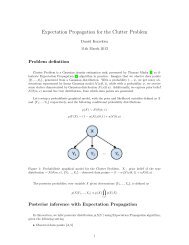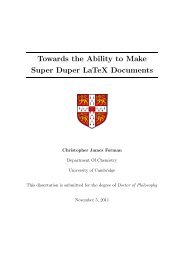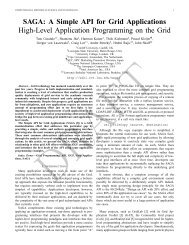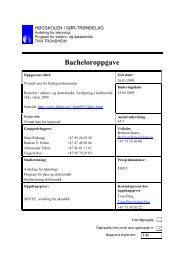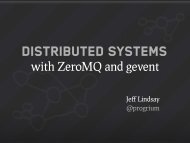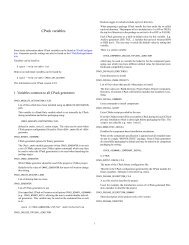Rich Hickey
Rich Hickey
Rich Hickey
Create successful ePaper yourself
Turn your PDF publications into a flip-book with our unique Google optimized e-Paper software.
Simplicity Matters<br />
<strong>Rich</strong> <strong>Hickey</strong>
Simplicity is prerequisite for<br />
reliability<br />
Edsger W. Dijkstra
Word Origins<br />
Simple<br />
sim- plex<br />
one fold/braid<br />
vs complex<br />
Easy<br />
ease < aise < adjacens<br />
lie near<br />
vs hard
Simple<br />
One fold/braid<br />
One role<br />
One task<br />
One concept<br />
One dimension<br />
But not<br />
One instance<br />
One operation<br />
About lack of<br />
interleaving, not<br />
cardinality<br />
Objective
Easy<br />
Near, at hand<br />
on our hard drive, in<br />
our tool set, IDE, apt<br />
get, gem install...<br />
Near to our<br />
understanding/skill set<br />
familiar<br />
Near our capabilities<br />
Easy is relative
Limits<br />
We can only hope to<br />
make reliable those things<br />
we can understand<br />
We can only consider a<br />
few things at a time<br />
Intertwined things must be<br />
considered together<br />
Complexity undermines<br />
understanding
Change<br />
Do more, Do it differently, Do it better<br />
Changes to software require analysis and decisions<br />
Your ability to reason about your program is critical<br />
More than tests, types, tools, process
Simplicity = Opportunity<br />
Architectural Agility wins<br />
else - push the elephant<br />
Design is about pulling things apart<br />
Repurpose, substitute, move, combine, extend
LISP programmers know the value of<br />
everything and the cost of nothing.<br />
Alan Perlis
Programmers know the benefits of<br />
everything and the tradeoffs of<br />
nothing.
Programmers vs Programs<br />
We focus on ourselves<br />
programmer convenience<br />
programmer replaceability<br />
Rather than the programs<br />
software quality, correctness<br />
maintenance, change<br />
gem install hairball
Complect<br />
To interleave, entwine, braid<br />
Don’t do it!<br />
Complecting things is the<br />
source of complexity<br />
Best to avoid in the first place
Making Things Easy<br />
Bring to hand by installing<br />
getting approved for use<br />
Become familiar by learning, trying<br />
But mental capability?<br />
not going to move very far<br />
Make challenges easy by simplifying them
We can be creating the exact<br />
same programs out of<br />
significantly simpler components
What’s in your Toolkit?<br />
Complexity Simplicity<br />
State, Objects Values<br />
Methods Functions, Namespaces<br />
variables Managed refs<br />
Inheritance, switch, matching Polymorphism a la carte<br />
Syntax Data<br />
Imperative loops, fold Set functions<br />
Actors Queues<br />
ORM Declarative data manipulation<br />
Conditionals Rules<br />
Inconsistency Consistency
Simplicity--the art of<br />
maximizing the amount<br />
of work not done--is essential.<br />
http://agilemanifesto.org/principles.html
Simplicity is not an objective in<br />
art, but one achieves simplicity<br />
despite one's self by entering<br />
into the real sense of things<br />
Constantin Brancusi
Lists and Order<br />
A sequence of things<br />
Does order matter?<br />
[first-thing second-thing third-thing ...]<br />
[depth width height]<br />
set[x y z]<br />
order clearly doesn’t matter
Why Care about Order?<br />
Complects each thing with the next<br />
Infects usage points<br />
Inhibits change<br />
[name email] -> [name phone email]<br />
“We don’t do that”
Order in the Wild<br />
Complex Simple<br />
Positional arguments Named arguments or map<br />
Syntax Data<br />
Product types Associative records<br />
Imperative programs Declarative programs<br />
Prolog Datalog<br />
Call chains Queues<br />
XML JSON, Clojure literals<br />
...
Maps (aka hashes), Dammit!<br />
First class associative data structures<br />
Idiomatic support<br />
literals, accessors, symbolic keys...<br />
Generic manipulation<br />
Use ‘em
Information is Simple<br />
Don’t ruin it<br />
By hiding it behind a micro-language<br />
i.e. a class with information-specific methods<br />
thwarts generic data composition<br />
ties logic to representation du jour<br />
Represent data as data
Encapsulation<br />
Is for implementation details<br />
Information doesn’t have implementation<br />
Unless you added it - why?<br />
Information will have representation<br />
have to pick one
Wrapping Information<br />
The information class:<br />
IPersonInfo{<br />
getName();<br />
... verbs and other awfulness ...}<br />
A service based upon it:<br />
IService{<br />
doSomethingUseful(IPersonInfo); ...}
Can You Move It?<br />
Litmus test - can you move your subsystems?<br />
out of proc, different language, different thread?<br />
Without changing much<br />
Not seeking transparency here
Subsystems Must Have<br />
Well-defined boundaries<br />
Abstracted operational interface (verbs)<br />
General error handling<br />
Take/return data<br />
IPersonInfo - oops!<br />
Again, maps (hashes)
Simplicity is a Choice<br />
Requires vigilance, sensibilities and care<br />
Equating simplicity with ease and familiarity is wrong<br />
Develop sensibilities around entanglement<br />
Your 'reliability' tools (testing, refactoring, type systems)<br />
don't care if program is simple or not<br />
Choose simple constructs
Simplicity Matters<br />
Complexity inhibits understanding<br />
and therefor robustness<br />
Simplicity enables change<br />
It is the primary source of true agility<br />
Simplicity = Opportunity<br />
Go make (simple) things
Simplicity is the ultimate<br />
sophistication.<br />
Leonardo da Vinci





